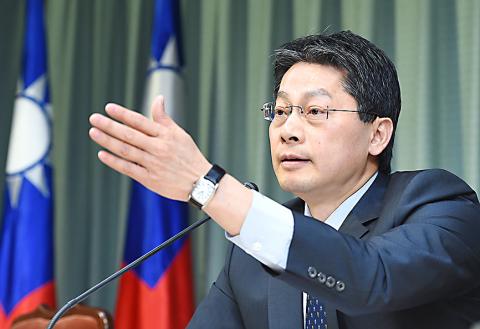About 10 critically ill refugees and asylum seekers being held on Nauru have received medical treatment in Taiwan since a memorandum of understanding (MOU) signed in September last year between Taiwan and Australia took effect in January, Ministry of Foreign Affairs spokesman Andrew Lee (李憲章) said in Taipei yesterday.
The Guardian on May 14 reported that an Iranian refugee who had been flown to Taiwan for critical heart surgery and her 17-year-old son were on May 10 taken back to Nauru by Australian Border Force officers “against psychiatric advice.”
Deputy Representative to the UK Cheng Shyang-yun (程祥雲) on May 18 wrote a letter to the newspaper saying that the refugees were not “forcibly returned” and that the patients had “completed their treatment prior to leaving Taiwan.”

Photo: Liao Chen-huei, Taipei Times
“In consideration of Taiwan’s high-quality medical facilities and long-standing medical cooperation with Nauru,” an MOU was signed allowing refugees and asylum seekers who require urgent medical treatment to be transferred to Taiwan, Cheng said.
The ministry last month also denied the allegations.
It confirmed that an MOU had been signed, adding that Taiwan Adventist Hospital has been overseeing the medical transfers since January.
On Friday, in an online article titled “Send them to Taiwan: Turnbull government’s secret refugee deal revealed,” the Sydney Morning Herald reported that the Australian government signed “an undisclosed arrangement aimed at stopping [refugees on Nauru] from applying to stay in Australia after being treated in local hospitals.”
“The [Australian] government has never announced the memorandum of understanding and refused to release it on Friday,” it said.
“Australia is understood to have sought assistance from more countries for medical transfers. But Taiwan is the only one that has signed a deal with the Turnbull government,” the paper added.
The Guardian on Saturday in an online article reported that asylum seekers who had been flown from Nauru to Taiwan have complained of language barriers.
It reported that the MOU was signed “in an effort to prevent people indefinitely detained on the island from applying for a medical transfer to Australia.”
Lee yesterday reiterated the terms of the MOU and Taiwan’s dedication to global health.
The WHO constitution clearly states that health is a basic human right, Lee said.
To respond to the WHO’s concept of universal health coverage, Taiwan, in addition to defending its citizens’ right to health, is devoted to boosting its contributions to global healthcare, he said.
Nauru is a diplomatic ally of Taiwan, Lee said, adding that medical cooperation with that country has been going on for years and has received praise.
The MOU clearly states that Taiwan and Australia should abide by international human rights standards, and ensure that those involved are treated with dignity and receive appropriate medical treatment, he added.

Taiwan is projected to lose a working-age population of about 6.67 million people in two waves of retirement in the coming years, as the nation confronts accelerating demographic decline and a shortage of younger workers to take their place, the Ministry of the Interior said. Taiwan experienced its largest baby boom between 1958 and 1966, when the population grew by 3.78 million, followed by a second surge of 2.89 million between 1976 and 1982, ministry data showed. In 2023, the first of those baby boom generations — those born in the late 1950s and early 1960s — began to enter retirement, triggering

ECONOMIC BOOST: Should the more than 23 million people eligible for the NT$10,000 handouts spend them the same way as in 2023, GDP could rise 0.5 percent, an official said Universal cash handouts of NT$10,000 (US$330) are to be disbursed late next month at the earliest — including to permanent residents and foreign residents married to Taiwanese — pending legislative approval, the Ministry of Finance said yesterday. The Executive Yuan yesterday approved the Special Act for Strengthening Economic, Social and National Security Resilience in Response to International Circumstances (因應國際情勢強化經濟社會及民生國安韌性特別條例). The NT$550 billion special budget includes NT$236 billion for the cash handouts, plus an additional NT$20 billion set aside as reserve funds, expected to be used to support industries. Handouts might begin one month after the bill is promulgated and would be completed within

The National Development Council (NDC) yesterday unveiled details of new regulations that ease restrictions on foreigners working or living in Taiwan, as part of a bid to attract skilled workers from abroad. The regulations, which could go into effect in the first quarter of next year, stem from amendments to the Act for the Recruitment and Employment of Foreign Professionals (外國專業人才延攬及僱用法) passed by lawmakers on Aug. 29. Students categorized as “overseas compatriots” would be allowed to stay and work in Taiwan in the two years after their graduation without obtaining additional permits, doing away with the evaluation process that is currently required,

IMPORTANT BACKER: China seeks to expel US influence from the Indo-Pacific region and supplant Washington as the global leader, MAC Minister Chiu Chui-cheng said China is preparing for war to seize Taiwan, Mainland Affairs Council (MAC) Minister Chiu Chui-cheng (邱垂正) said in Washington on Friday, warning that Taiwan’s fall would trigger a regional “domino effect” endangering US security. In a speech titled “Maintaining the Peaceful and Stable Status Quo Across the Taiwan Strait is in Line with the Shared Interests of Taiwan and the United States,” Chiu said Taiwan’s strategic importance is “closely tied” to US interests. Geopolitically, Taiwan sits in a “core position” in the first island chain — an arc stretching from Japan, through Taiwan and the Philippines, to Borneo, which is shared by